|
| NEWS |
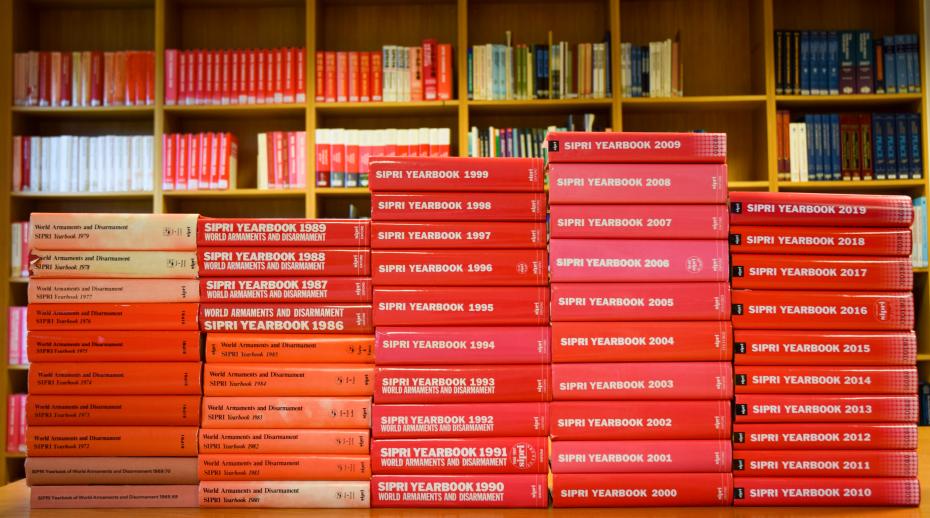 |
| Celebrating 50 years of the SIPRI Yearbook |
| SIPRI celebrates the launch of SIPRI Yearbook 2019 by making all editions from 1969 to 2016 available for free download. Originally published with the aim to ‘produce a factual and balanced account of a controversial subject—the arms race and attempts to stop it’, the SIPRI Yearbook has evolved to cover a variety of topics in armaments, disarmament and international security and transformed into an indispensable reference work. |
|
|
Read more | Explore the SIPRI Yearbook archives
|
|
|
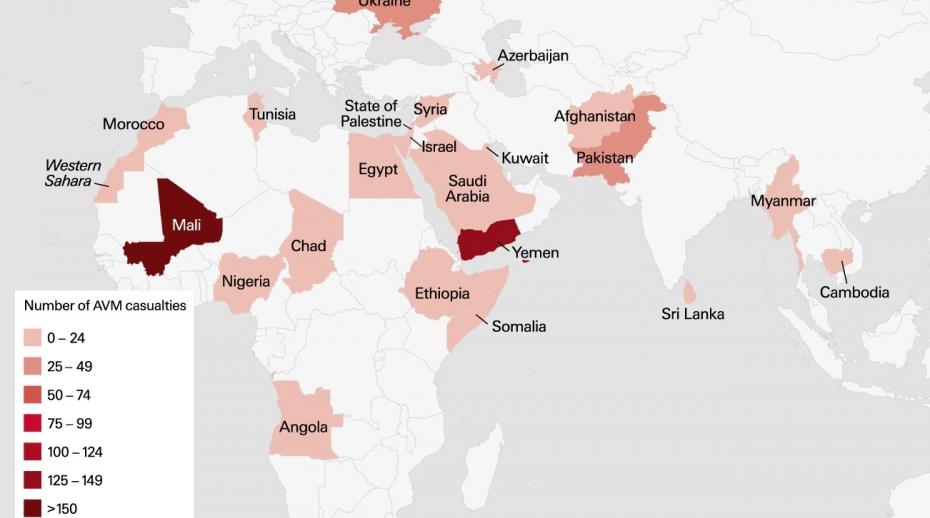 |
| GICHD and SIPRI release global report of anti-vehicle mine incidents in 2018 |
| The Geneva International Centre for Humanitarian Demining and SIPRI have released a new global report of anti-vehicle mine (AVM) incidents in 2018. The report examines disaggregated AVM incident data collected in 2018. Detailed geo-referenced data is available as part of the study. |
|
|
Read more | Download the report | Explore interactive maps
|
|
|
 |
| SIPRI hosts Minister of Foreign Affairs of Iran |
| SIPRI hosted HE Dr Mohammad Javad Zarif, Minister of Foreign Affairs of Iran, for a public seminar. The event was part of an official visit to Sweden and began with a presentation by Dr Zarif entitled ‘International Law and Unilateralism’. This was followed by a wide-ranging discussion guided by a series of questions from members of the international audience and media representatives. |
|
|
Read more
|
|
|
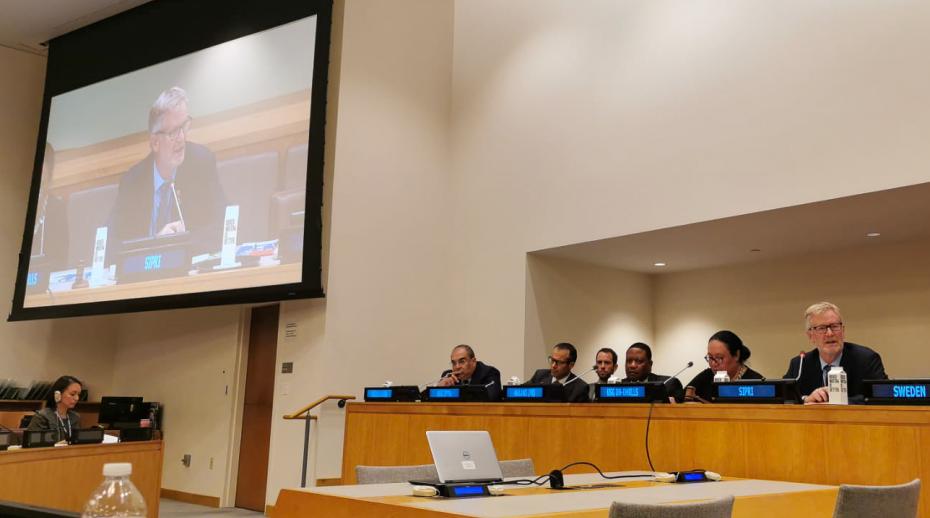 |
| SIPRI informs at the UN High-Level Political Forum |
| SIPRI engaged with the High-Level Political Forum (HLPF) at the United Nations in several ways. SIPRI co-hosted an event on ‘Agenda 2030 at a crossroads—How do we ensure an integrated approach in tackling climate-related security risks, conflict and inequality?’ SIPRI also presented key reflections resulting from the 2019 Stockholm Forum on Peace and Development. These reflections guided discussions on Sustainable Development Goal 16. Finally, SIPRI issued two publications to help to inform discussions at the HLPF. |
|
|
Read more
|
|
|
| COMMENTARY |
 |
| The inclusion of gender-based violence concerns in arms transfers decisions: The case of the Arms Trade Treaty |
| The inclusion of a provision on gender-based violence (GBV) in the Arms Trade Treaty (ATT) is particularly important as—for the first time—it means that the link between GBV and weak arms trade regulation is formally recognized by an international and legally binding treaty. This blog describes how the recognition of the impact of the illicit trade in conventional arms on GBV has been translated into the ATT. It also highlights the main issues related to the implementation of this provision and measures have been proposed to address them. |
|
Read the WritePeace blog
|
|
|
 |
| Advances in 3D printing technology: Increasing biological weapon proliferation risks? |
| In July and August, the states parties to the Biological and Toxin Weapons Convention gathered in Geneva for a series of Meetings of Experts. Ahead of the meetings, Kolja Brockmann, a Researcher in SIPRI’s Dual-use and Arms Trade Control Programme, wrote a blog post explaining how additive manufacturing—also referred to as 3D printing—may facilitate the proliferation of biological weapons. The blog also underlines the potential role of export controls in reducing these risks. |
|
Read the WritePeace blog
|
|
|
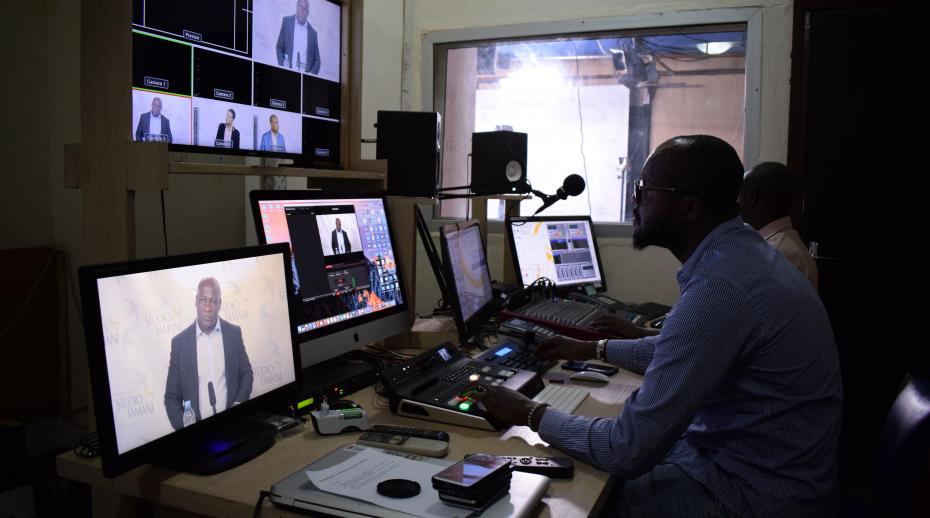 |
| Understanding local perceptions of security in Mali: The White Book |
| The English summary of the Civil Society White Book on Peace and Security in Mali (White Book) is now available. In the White Book, Malian civil society organizations advocate for the inclusion of local security needs in response to the deteriorating security situation in the country. The data used in the White Book has been collected over three years and originates from research conducted by SIPRI and its partner organization, the National Coalition of Civil Society for Peace and the Fight Against the Proliferation of Small Arms. |
|
Read the WritePeace blog | Read the White Book
|
|
|
|
| UPCOMING EVENTS |
| |
| 3 October 2019 |
| 2019 Stockholm Security Conference |
|
On 3 October 2019, SIPRI will host the fourth Stockholm Security Conference. This year the conference will be held under the theme ‘Conflict and technology: Now and in the future’. Through plenary and breakout sessions, the conference will look at how the nature of conflict is changing today and what impact technology has on conflict.
|
|
Read more
|
|
|
| RECENT EVENTS |
| |
| 27 July 2019 |
| A Farewell to Arms Treaties?: The Future of Nuclear Disarmament |
| SIPRI, in collaboration with Japan Broadcasting Corporation, hosted a panel discussion on world nuclear forces and arms control. The event was part of the Japanese television programme Global Agenda and was broadcast to an international audience on 27 July. |
|
Read more | Watch the episode
|
|
| |
| 2 July 2019 |
| SIPRI co-hosts event at Almedalen Week |
| During Almedalen Week in Visby, Gotland, SIPRI hosted a panel discussion with the World Food Programme about the link between hunger and conflict in Mali. Initial conclusions were presented from a case study conducted in Mali. The panel explored how hunger affects the conflicts in Mali and questioned whether it is possible to build sustainable peace without securing access to food. |
|
Read more | Watch the discussion
|
|
| |
| 21 June 2019 |
| SIPRI co-hosts seminar in Berlin on managing the collapse of the INF Treaty |
| SIPRI, in partnership with the Heinrich Böll Foundation and the European Leadership Network, held a seminar on managing the collapse of the 1987 Treaty on the Elimination of Intermediate-Range and Shorter-Range Missiles (INF Treaty). The event took place at the Heinrich Böll Foundation’s headquarters in Berlin. |
|
Read more
|
|
| JOB VACANCIES |
| |
| Three current openings |
|
SIPRI is currently recruiting for three positions:
- Editor, Editorial and Publications Department
- Senior Researcher and Programme Director, Arms and Military Expenditure Programme
- Senior Researcher, China and Asia Security Programme
|
|
Read more
|
|
|
| PUBLICATIONS |
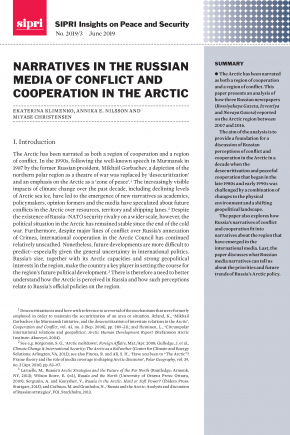 |
| Narratives in the Russian media of conflict and cooperation in the Arctic |
| The Arctic has been narrated as both a region of cooperation and a region of conflict. This paper presents an analysis of how three Russian newspapers (Rossiyakaya Gazeta, Izvestiya and Novaya Gazeta) reported on the Arctic region between 2007 and 2016. The aim of the analysis is to provide a foundation for a discussion of Russian perceptions of conflict and cooperation in the Arctic. |
|
Read the publication
|
|
|
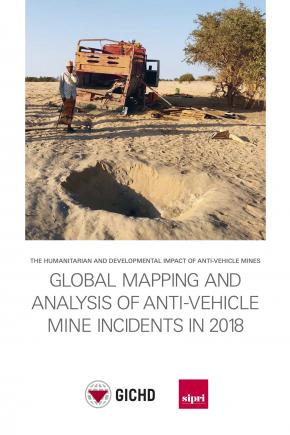 |
| Global mapping and analysis of anti-vehicle mine incidents in 2018 |
| There is a need for systematic data collection on AVM incidents. In response to this need, SIPRI and its partner, the Geneva International Centre for Humanitarian Demining have been collecting global data on AVM incidents since 2015 with the aim to improve evidence on the impact of AVMs and identify trends in AVM impact. This report presents and examines AVM incident data from 2018. |
|
Read the publication
|
|
|
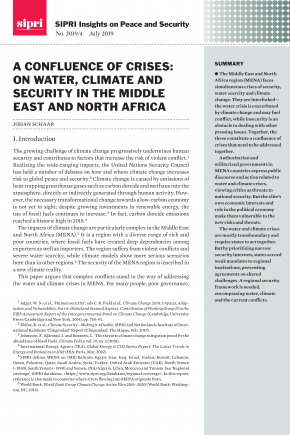 |
| A confluence of crises: On water, climate and security in the Middle East and North Africa |
The impacts of climate change are particularly complex in the Middle East and North Africa (MENA). It is a region with a diverse range of rich and poor countries, where fossil fuels have created deep dependencies among exporters as well as importers. This paper argues that complex conflicts stand in the way of addressing
the water and climate crises in MENA. |
|
Read the publication
|
|
|
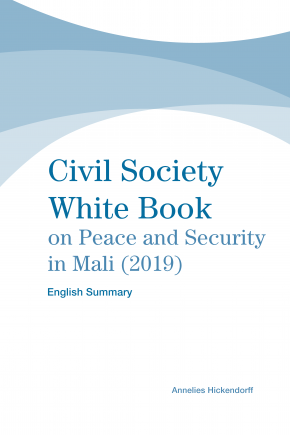 |
| Civil Society White Book on Peace and Security in Mali (2019), English Summary |
| This paper presents an English-language summary of the Civil Society White Book on Peace and Security in Mali (White Book). In the White Book, Malian civil society organizations call for political solutions to the deteriorating security situation in Mali. These recommendations are built on data collected during three years of quantitative and qualitative research on the security needs and perceptions of civil society actors by SIPRI and its partner, the National Coalition of Civil Society for Peace and the Fight Against the Proliferation of Small Arms. |
|
Read the publication
|
|
|
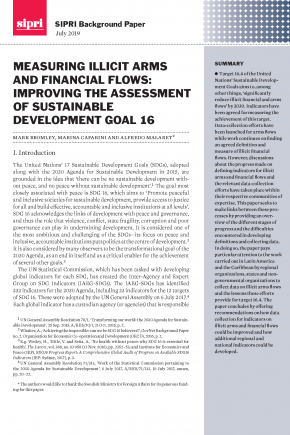 |
| Measuring illicit arms and financial flows: Improving the assessment of Sustainable Development Goal 16 |
| Target 16.4 of the United Nations’ Sustainable Development Goals aims to, among other things, ‘significantly reduce illicit financial and arms flows’ by 2030. Indicators have been agreed for measuring the achievement of this target. Data-collection efforts have been launched for arms flows while work continues on finding an agreed definition and measure of illicit financial flows. This paper seeks to make links between these processes by providing an overview of the different stages of progress and the difficulties encountered in developing definitions and collecting data. |
|
Read the publication
|
|
|
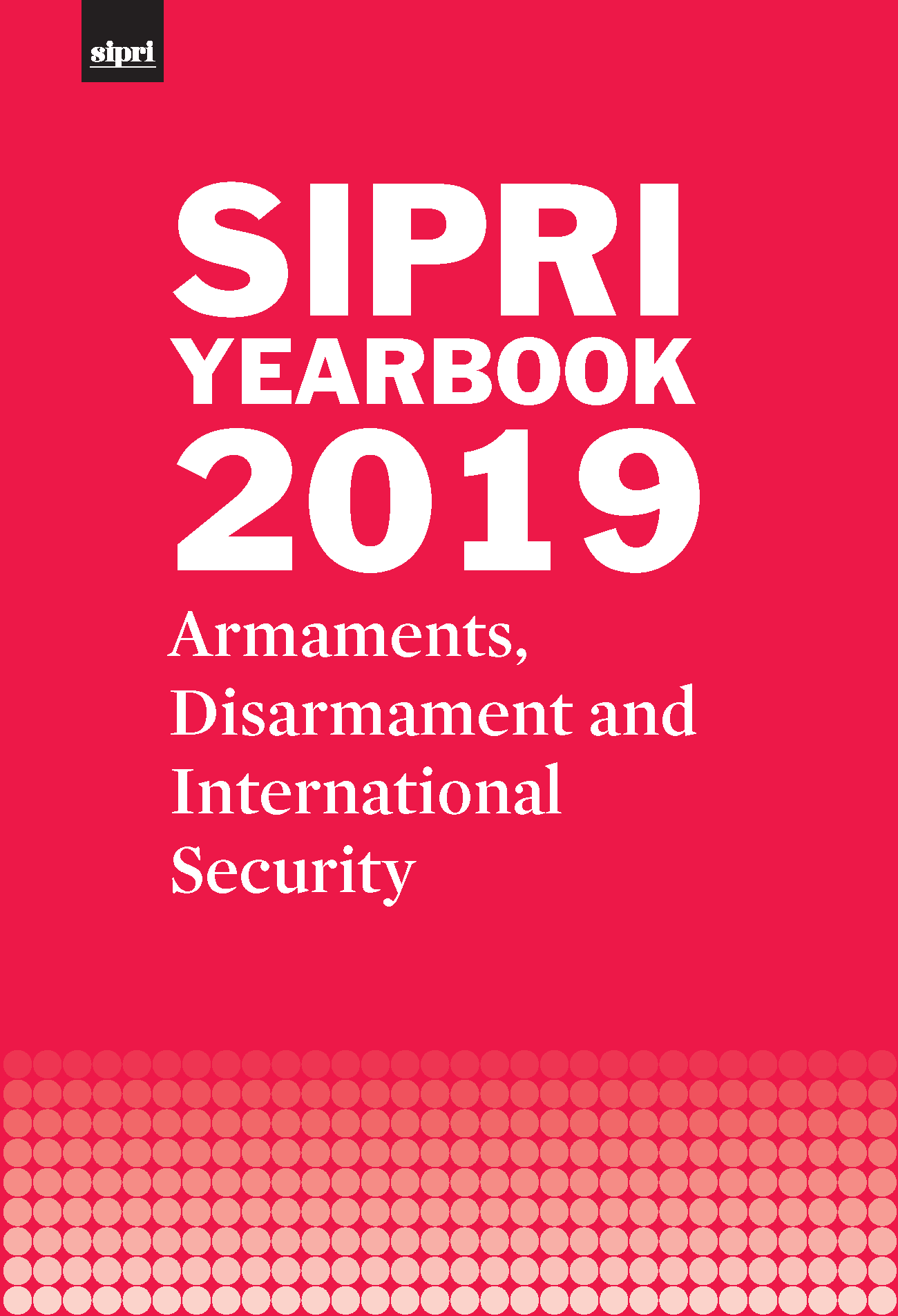 |
| SIPRI Yearbook 2019 |
The 50th edition of the SIPRI Yearbook is a compendium of data and analysis in the areas of security and conflicts; military spending and armaments; and non-proliferation, arms control and disarmament. It covers developments during 2018, including:
- the state of nuclear arms control;
- transparency in military spending;
- UN peacekeeping reform; and
- allegations of chemical weapon use in Syria and the United Kingdom.
|
|
Browse the contents page | Read the summary [PDF]
|
|
|
| |